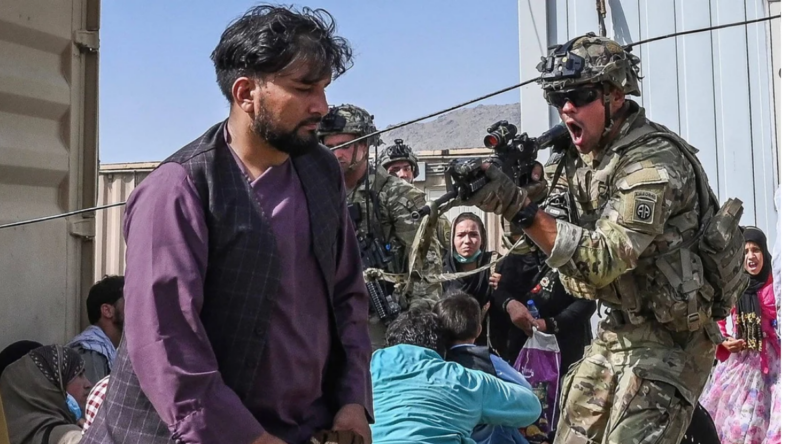The loss of the United States and the Taliban’s takeover of power represents a watershed moment. When Afghan women are leading the resistance, this shows both imperialism and fundamentalism as impediments to human liberation.
Taliban
The Taliban, also known as the Islamic Emirate of Afghanistan, is an Afghan Deobandi Islamic fundamentalist political and military group.
The Taliban now have a de facto rule of Afghanistan, as one of two groups claiming to be the official government of Afghanistan, alongside the internationally recognized Islamic Republic of Afghanistan.
The Taliban’s philosophy has been defined as a “novel” version of Sharia Islamic law based on Deobandi fundamentalism and militant Islamism, coupled with Pashtun social and cultural values known as Pashtunwali, as the majority of Taliban are Pashtun tribesmen.
What Happend over Afganistan ?
The Taliban seized control in Afghanistan on August 18, 2021, just as the United States was ready to conclude its troop departure after a two-decade conflict.
As Afghan security personnel trained and equipped by the US and its allies faded away, militants swept over the nation, seizing all major cities in a matter of days.
The Taliban, a terrorist organization that ruled the country in the late 1990s, has seized power once more.
The militants were driven from power by the US-led invasion of Afghanistan in 2001, but they never left. After a recent blitz across the country, the Western-backed government that has ruled the country collapsed for the past 20 years. Afghans, fearful for their future, rushed to the airport, one of the country’s last exit points.
Taliban’s Internal funding was provided by the group’s activities in the illicit drug trade, including the production and trafficking of drugs such as heroin, extortion, and abduction and ransom.
They also took control of mining activities that were unlawful under the previous administration in the mid-2010s.
Peoples are feeling for the country
They are fearful that the country will collapse into chaos or that the Taliban will retaliate against those who have worked with the Americans or the government.
Many people fear that the Taliban will reimpose the harsh interpretation of Islamic law when they controlled Afghanistan from 1996 to 2001.
Women were not permitted to attend school or work outside the home at the period. When they did go outside, they were required to wear the all-encompassing burqa and be supervised by a male relative—the Taliban prohibited music and stoned adulterers after severing their hands.
Over the years, Taliban has attempted to depict itself as a more moderate group. They have vowed to protect women’s rights, pardon those who fought against them and prevent Afghanistan from being used as a base for terrorist acts since assuming power. However, many Afghans remain suspicious of these assurances.
The Taliban was deposed from power in Afghanistan by US-led forces in 2001, but the organization has retaken authority following a swift onslaught.
Kabul, the capital, was the final major city to succumb to the onslaught, which began months ago but intensified as hardline Islamists seized territory.
Now What ?
Russia, China, and even Iran and the Taliban’s long-standing partner Pakistan have all supported the Taliban’s ascent to power, intending to restore regional security.
Despite years of fighting the Taliban, the US government’s unspoken attitude hasn’t changed all that much. To begin, it is worth noting how careful the US was to avoid antagonizing the Taliban in its closing months in the nation to bring its forces out safely.
Second, as revealed in an unguarded moment by none other than Chairman of the Joint Chiefs of Staff Mark Milley, the United States’ most significant concern for the future is not repression of the Afghan people but destabilization.
Milley warned of the dangers of a battle between pockets of ISIS and the Taliban within Afghanistan, saying, “I think there’s at least a very strong possibility of a larger civil war, and that would then lead to conditions that may in fact lead to the reconstruction of al Qaeda or the rise of ISIS.
However, long-term “stability” under the Taliban seems unlikely. They are, to be sure, descended from the country’s largest ethnic group, the Pashtuns, but they remain a minority in the country.
Furthermore, the Taliban’s regressive worldview is not universally accepted even within the socially conservative Pashtun group, let alone in a multi-ethnic and increasingly urbanized society.
Even if they can cement their power over a population so tired of war that any peace may appear in a Hobbesian manner to be an acceptable consequence, they lack the capacity or desire to improve the population’s living and working conditions.
Overall, the situation is bleak in the immediate term, as Afghanistan is coming under the rule of one of the most retrogressive regimes on earth during food shortages, general economic deprivation, the destruction of war, Covid-19, and severe drought.
At this point, the international left, human rights organizations, feminists, and other progressives mustn’t turn a blind eye to the situation and continue to assist our Afghan brothers and sisters as best we can.
These include everything from public anti-Taliban and pro-feminist rallies, such as those recently held in Paris, Los Angeles, and other places, to the struggle for Afghan immigrants’ and refugees’ right to cross borders and be welcomed.













